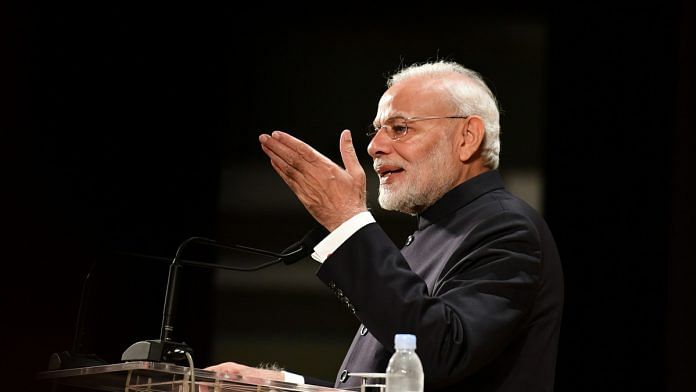Within just two hours of the terrorist attack on the CRPF convoy in Pulwama, television anchors and experts began to calculate the electoral dividends and losses for Narendra Modi. The political leadership, mainly of the Opposition, however, remained solemn. Such cynical analysis was not visible even in the aftermath of the 1999 Kargil war, just a month after BJP’s Atal Bihari Vajpayee lost a crucial no-confidence vote.
Back in 1999, the mood for the Lok Sabha election was just building up, like it is now. Some commentators even speculated this week that the general election could be postponed. After all, the Pulwama attack is an emergency and the nation is in danger.
Jingoistic messages like ‘decimate and destroy Pakistan’, ‘wipe the country off the map’, ‘show the Pakistanis what superpower India can do under Modi’, or ‘tell them that their Islamic gangs are not dealing with weak Congress now, but brave heart Hindus’ are gaining traction.
Television journalism was not as pervasive in 1999 as it is today and the talking heads had not perfected the art of being loud and provocative. There were no smartphones and no social media back then. Today, there is a full-scale war on the WhatsApp battlefield and nuclear threats are being issued on Facebook.
Also read: Jaish could use Pulwama attack to recruit more local Kashmiri youth, fear security forces
Some channels went to the extent of discussing which Indian missile will hit Islamabad, Lahore or Karachi in the shortest time, and that too in a surprise attack! Both the anchors and self-styled military experts waxed eloquent on the necessity of ‘teaching’ Imran Khan a few lessons in warfare.
One channel even claimed to have inside knowledge about the Army preparing for a midnight attack on Masood Azhar. Our forces would carry out the ‘Mission Impossible’ just like the US Special Forces, who daringly attacked Osama Bin Laden’s secret house to eliminate him.
The media experts also analysed the consequences of a possible (again surprise) nuclear attack on Pakistani cities. However, they did not realise that Karachi was part of the Bombay province just about 80 years ago, and its proximity to the commercial capital of India could bring atomic clouds over the latter.
Also read: Post Pulwama attack, 10 hard questions for the Narendra Modi government
But patriotism and ‘killer instinct’ were at their peak during the TV debates, like they are in drawing room discussions. Neither the anchors, nor most viewers had ever seen a war; they probably don’t even play war games on their smartphones. (Children who play such games on phones do not listen to profound TV debates on wars!)
Analysts and TV anchors even suggested that the attack in Pulwama will help bolster Narendra Modi’s image as a leader of ‘firm action’ ahead of the election, and bring the fence-sitting voters into the BJP fold.
The irrationality of the electoral argument turned absurd when an expert said, “Now Rahul won’t dare criticise the Rafale deal because its necessity has been proved by the attack in Kashmir”. Most debates took a rather hilarious turn when the argumentative Indians on the shows could not distinguish between the Pakistanis and the Opposition. They were seen wielding swords against both with equal fervour and animosity.
Never before has a huge human tragedy turned into an instant ‘cry for war’ and degenerated into an election campaign. Attack on Parliament in December 2001 did generate hawkish heat, but there was no election round the corner. The 1965 war with Pakistan too raised the patriotic pitch, but did not define the contours of the election in 1967.
The 1971 war, which led to the liberation of Bangladesh, was fought nine months after the ‘garibi hatao’ election. So, Kargil was the only war just before the elections. But in the absence of 24×7 TV debates and social media, Kargil could not lead to the kind of frenzy that we are witnessing now.
Also read: Pulwama attack proves JeM chief Masood Azhar’s 2014 public address wasn’t a ‘one-time event’
Pulwama will have some electoral consequence, but it is too early to predict the scale.
It will not be easy for the government to explain the abject failure of our security system. How did a vehicle loaded with tonnes of explosives ram a CRPF convoy? Why was it not identified by the check posts? The governor of Jammu and Kashmir, Satyapal Malik, was candid when he admitted that there was a security lapse. Now some reports suggest that there were intelligence inputs about a likely attack.
And yet, if the Modi government indeed goes for a war, it would change everything – election schedule and outcome. The war’s impact on the Indian subcontinent would be catastrophic.
We are truly sitting on a volcano, but does the media care? Does it even understand the gravity and consequences of war?
The collective cynicism can lead to self-destructive decisions. We must not let the medium become the master of our destiny.
Kumar Ketkar is a former editor and Congress member of Rajya Sabha.




Many fine achievements over the last few years. No need to add war with Pakistan to that list.